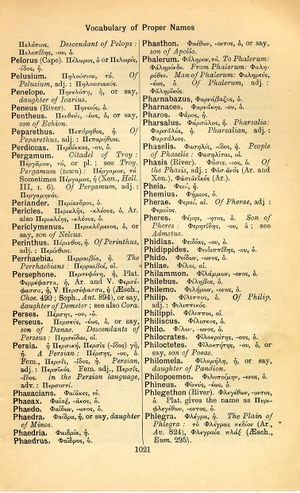Phaedrus: Difference between revisions
Οὕτως γὰρ ἠγάπησεν ὁ Θεὸς τὸν κόσμον, ὥστε τὸν Υἱὸν τὸν μονογενῆ ἔδωκεν, ἵνα πᾶς ὁ πιστεύων εἰς Αὐτὸν μὴ ἀπόληται ἀλλ᾽ ἔχῃ ζωὴν αἰώνιον → For God so loved the world that he gave his only begotten Son that whosoever believeth in him should not perish but have everlasting life (John 3:16)
(6_12) |
(D_7) |
||
| Line 4: | Line 4: | ||
{{Lewis | {{Lewis | ||
|lshtext=<b>Phaedrus</b>: (nom. PHAEDER, Inscr. Grut. 1111, 3), i, m., = Φαῖδρος.<br /><b>I</b> A [[pupil]] of [[Socrates]], a [[native]] of Myrsinus, in [[Attica]], [[after]] whom [[Plato]] named one of his dialogues, Cic. de Or. 1, 7, 28; id. Or. 4, 15; 12, 39; id. Fin. 2, 2, 4; id. Tusc. 1, 22, 53 al. —<br /><b>II</b> An Epicurean [[philosopher]] of [[Athens]], an [[instructor]] of [[Cicero]], Cic. Fam. 13, 1, 2; id. Fin. 1, 5, 16; id. N. D. 1, 33, 93; id. Phil. 5, 5, 13.—<br /><b>III</b> A [[freedman]] of [[Augustus]], a Thracian by [[birth]], and [[author]] of [[some]] [[well]]-[[known]] Latin fables. | |lshtext=<b>Phaedrus</b>: (nom. PHAEDER, Inscr. Grut. 1111, 3), i, m., = Φαῖδρος.<br /><b>I</b> A [[pupil]] of [[Socrates]], a [[native]] of Myrsinus, in [[Attica]], [[after]] whom [[Plato]] named one of his dialogues, Cic. de Or. 1, 7, 28; id. Or. 4, 15; 12, 39; id. Fin. 2, 2, 4; id. Tusc. 1, 22, 53 al. —<br /><b>II</b> An Epicurean [[philosopher]] of [[Athens]], an [[instructor]] of [[Cicero]], Cic. Fam. 13, 1, 2; id. Fin. 1, 5, 16; id. N. D. 1, 33, 93; id. Phil. 5, 5, 13.—<br /><b>III</b> A [[freedman]] of [[Augustus]], a Thracian by [[birth]], and [[author]] of [[some]] [[well]]-[[known]] Latin fables. | ||
}} | |||
{{Gaffiot | |||
|gf=<b>Phædrus</b>,¹⁵ drī, m. (Φαῖδρος),<br /><b>1</b> un des disciples de Socrate dont [[Platon]] prit le nom comme titre d’un dialogue [le Phèdre] : Cic. Tusc. 1, 53<br /><b>2</b> [[philosophe]] épicurien : Cic. Fam. 13, 1, 2<br /><b>3</b> Phèdre [fabuliste]. | |||
}} | }} | ||
Revision as of 06:42, 14 August 2017
English > Greek (Woodhouse)
Φαῖδρος, ὁ.
Latin > English (Lewis & Short)
Phaedrus: (nom. PHAEDER, Inscr. Grut. 1111, 3), i, m., = Φαῖδρος.
I A pupil of Socrates, a native of Myrsinus, in Attica, after whom Plato named one of his dialogues, Cic. de Or. 1, 7, 28; id. Or. 4, 15; 12, 39; id. Fin. 2, 2, 4; id. Tusc. 1, 22, 53 al. —
II An Epicurean philosopher of Athens, an instructor of Cicero, Cic. Fam. 13, 1, 2; id. Fin. 1, 5, 16; id. N. D. 1, 33, 93; id. Phil. 5, 5, 13.—
III A freedman of Augustus, a Thracian by birth, and author of some well-known Latin fables.
Latin > French (Gaffiot 2016)
Phædrus,¹⁵ drī, m. (Φαῖδρος),
1 un des disciples de Socrate dont Platon prit le nom comme titre d’un dialogue [le Phèdre] : Cic. Tusc. 1, 53
2 philosophe épicurien : Cic. Fam. 13, 1, 2
3 Phèdre [fabuliste].

